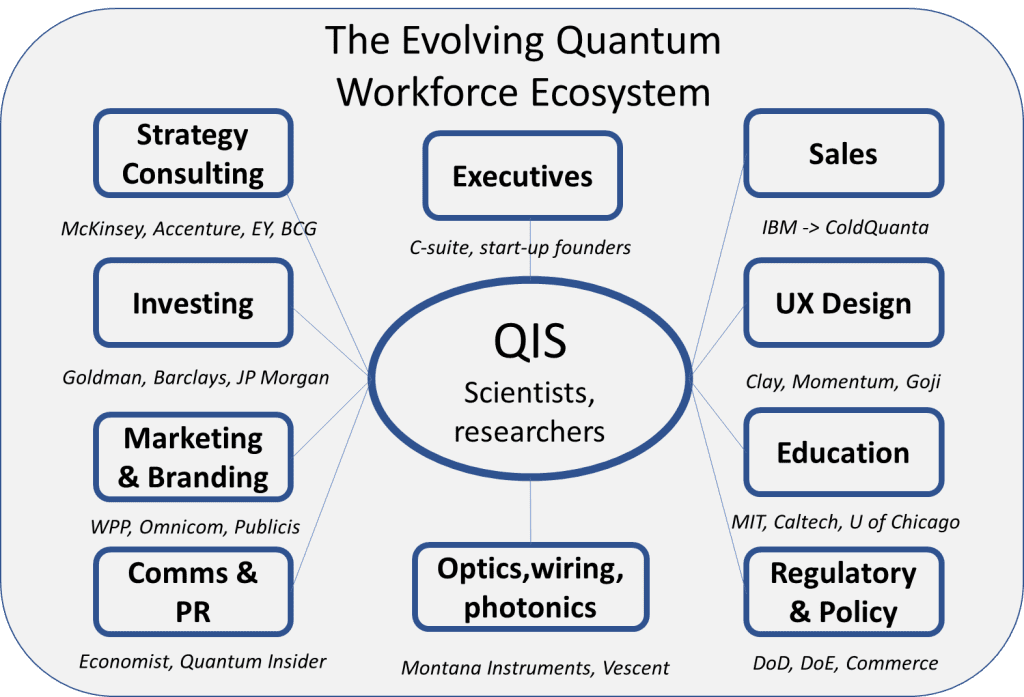Artificial Intelligence
Future Telecoms
Holograms: from sci-fi to reality? Not quite
Reading time: 4 mins
Quantum technologies will redefine how we think about work, education, and crafting businesses
Before he became a TEDx speaker, quantum industry evangelist and podcast host, Christopher Bishop was a working bass player sharing stages with bands such as ZZ Top, Fleetwood Mac and Weather Report. He studied jazz with John Coltrane’s bassist Jimmy Garrison and spent his early twenties on the road, playing with Bo Diddley and even Chuck Berry, before eventually joining IBM in the ’90s.
For anyone looking at the quantum industry and wondering whether or not they qualify, there is something to be learned here. For Bishop, who says he has had “eight careers,” the common thread is “curiosity.” But also resilience.
It’s interesting that IBM recognised these traits when he landed a strategy and innovation role, having had no previous experience. Hanging out backstage with the likes of guitarist Jeff Beck and then producing advertising jingles (after teaching himself digital audio and HTML) had in some way helped to open a new, unexpected door.
His story suggests that mindset can matter just as much as a master’s degree, especially when it comes to supporting founders in developing a business idea. This feeds into Bishop’s more recent work. He refers to himself as a blend of historian, technologist, and career improviser, and it’s his mission to now demystify the quantum workforce and help people see where they might fit.
“Quantum companies are no longer just academic spinouts, they’re businesses,” says Bishop. “They need revenue. That means skills far beyond physics.”
While physicists and quantum engineers remain essential, Bishop argues that the future of quantum work depends on a far more diverse and adaptable talent base. The sector needs people who can code in Qiskit or Q#, yes but also those who can explain, sell, manage, design, and scale.
And demand is growing. According to the UK government’s Quantum Skills Taskforce, the global industry could require up to 840,000 quantum-literate workers by 2035. That’s a leap from today’s tightly focused R&D roles to a sprawling ecosystem of software developers, UX designers, cryptographers, hardware engineers, business developers, and policy analysts.

“You could be a rock star and work in quantum,” says Bishop. “It’s about problem-solving. It’s about flexibility. These companies need people who can build the future even if their CV doesn’t look traditional.”
Bishop regularly analyses real job listings in quantum to track trends. The picture that emerges is striking. Software roles are multiplying, as companies pivot towards AI-quantum integrations, he says. Others focus on near-term hardware plays like quantum sensing, where practical applications already exist, from medical diagnostics to GPS-denied navigation.
“The biggest gaps aren’t always technical,” Bishop says. “There’s a shortage of marketing, UX, business development, even comms. Quantum doesn’t need evangelists. It needs translators.”
As one example, he recalls a laser company where the most valuable team member wasn’t a PhD physicist but a rigorous quality-control expert with decades of hands-on testing experience. “She’s brutal. Nothing gets past her. And that’s why everything works.”
This philosophy underpins his book, Improvising Careers: Succeed At Jobs That Don’t Exist Yet, which explores the evolving nature of work and offers a framework for navigating uncertainty. In it, Bishop argues that the ability to pivot – to learn, unlearn, and reinvent – is not just useful, but essential in emerging industries like quantum.
The world of work, Bishop argues, is being fundamentally transformed and quantum is one of the clearest signs of what’s to come.
“It’s not about waiting for a job title to appear,” he says. “It’s about building the mindset and skills to help invent it.”
Individuals can navigate a fast-changing job market by staying curious, building adaptable networks, and spotting opportunities at the edges of emerging industries.
As the publisher’s blurb of his book puts it: “Nanopharmacist? Lunar tour guide? Robotic ethics consultant? Augmented reality content designer? Quantum algorithm programmer? These jobs may not sound familiar now, but they will in due time.”
In this sense, he encourages students, career-switchers, and employers alike to think beyond credentials. The book outlines a practical toolkit built around three ideas.
In his book Improvising Careers and “Secrets To Working In Quantum” workshops, Bishop shares a three-part strategy for people looking to break into emerging tech fields:
Voice
Identify what excites you – your favourite problems or stories.
“Start with what makes you curious. That’s your compass.”
Antenna
Tune into where the conversations are happening – podcasts, journals, social media.
“Create a media routine. Stay close to the frontier.”
Mesh
Build your network by connecting with people and communities in the field.
“It’s not just what you know. It’s who knows you – and why.”
This message is increasingly relevant as quantum technologies edge closer to commercial reality. In the UK, the government’s Quantum Skills Taskforce has laid out a roadmap to broaden the workforce through industry placements, modular training, and greater collaboration between academia and business.
One of the key challenges now is regional capacity. How do we scale the skills needed not just in London and Cambridge, but in emerging hubs across the country? For Bishop, Bristol stands out as a model worth watching, not only for its academic strength, but for the way it connects research, start-ups, and outreach.
Bishop’s own move into quantum wasn’t exactly planned but it made perfect sense. After years working at the intersection of storytelling, technology, and innovation at IBM, he began hosting panels and events for The Economist’s Commercialising Quantum series. That experience sparked a deeper fascination.
The mix of deep science, business potential, and career ambiguity resonated with his own path. Since then, he’s delivered workshops for the Quantum Economic Development Consortium (QED-C), spoken at global quantum events, and launched Qubit Confidential, a video podcast focused on the people shaping the field.
“Quantum needs translators,” he says. “People who can connect the dots, communicate the value, and help build the future.”
To scale quantum meaningfully, Bishop adds that the UK needs to get serious about interdisciplinary education, modular training, and opening the door to unconventional backgrounds. It’s a sobering point, about education in general and the role of governments in enabling young people to develop skills knowing that there are opportunities for work.
“This generation can shape the future of work more than any before,” he says. “Quantum is the ultimate testbed. And if we get the workforce right, the possibilities are endless.”

Working as a technology journalist and writer since 1989, Marc has written for a wide range of titles on technology, business, education, politics and sustainability, with work appearing in The Guardian, The Register, New Statesman, Computer Weekly and many more.
Quantum
Reading time: 10 mins
Quantum
Reading time: 10 mins
Future Telecoms
Reading time: 2 mins
Quantum
Reading time: 11 mins
Robotics
Reading time: 1 mins